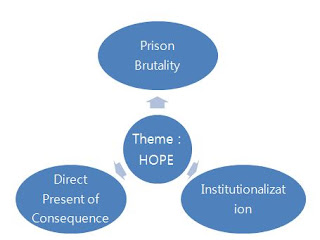Ye Ji Park / 111053 / 6
Mr.Garrioch
English Composition
October 30 2011
Reading Journal: The Body
Wallace Stevens, one of America's most respected poets in 20th century, wrote "Death is the mother of beauty" in his poem, Sunday Morning. Once writing a short essay about this quotation, I interpreted that death is beauty’s mother due to its presence. To illustrate; people fear death because they don’t know what is after death. That is, the ordinary days of living is ended once dead. Thus, confronting death makes people treat life much more seriously and valuable than before – in other words, their attitudes toward life becomes matured.
These are my rough impressions after reading few pages of The Body, the third novella in Stephen King’s Different Seasons. On the way to find the dead body of Ray Brower, a kid of their age hit by a train, four boys experience maturation; mainly two kinds, emotional maturity and relationship maturity.
First, what emotional maturity means is the process of changing aptitude in expressing own emotion. When the boys first hear about the dead body, they “grinned” over the adventure, and excited that they can “find the body and report it, and be on the news”. Nevertheless, in each one’s heart, sprout of fear also had existed. When Vern suggested the travel, the boys “all looked at him for a long second, no one saying anything” because this sprout was telling boys to keep away from such troublesome, gossipy issue. To add, Gordie, the narrator, confessed he “felt funny—both excited and scared” and this “mixture of emotions made him feel heatsick and headachy”. Still, boys do not discuss any kind of these feelings; this is because they’re bluffing. That is, they’re trying to be shown brave and strong, thus not to be mocked by others as coward.
However, as they continue their travel, boys start to express their emotions much more frankly. In chapter 13, Vern admitted that he “sometimes get nightmares”, and when he wakes up during nightmares, “it seems like there’s somethin under the bed and if he dangled a hand over the side, that thing might grab him”. Vern hesitated on continuing the travel, because if the dead boy is “really bad”, he will have “nightmares about him and wake up thinkin it’s him under the bed, all cut up in a pool of blood”. And Chris indirectly agreed to Vern’s fear, that “it shouldn’t be no good time”. The boys, now, are discussing about the fear and terror they considered as a shame previously. In other words, the boys start to admit own weakness, and sympathize at others’ instead of mocking them for being weak. Acknowledging their emotional vulnerability and understanding others’ sentiments is definitely a sign of maturity, compared to the previous pretentious acts.
Second maturity boys experience is titled relationship maturity, especially relationship with family and friends. One common point four boys share is that they have a family flaw. Chris has a “really mean” father, and Vern “hated Billy [his brother] like the Arabs hate the Jews”. Teddy had an odd father who made him use glasses and hearing-aid by “shoving … Teddy’s head down against one of the cast-iron burner plates”, and now in “Togus, which is a VA hospital”. For Gordie, he lost his brother recently, and his parents were floundering in the wave of sadness, indifferent to Gordie. All boys, except Teddy, seem to feel hatred rather than affection to their family. For example, Gordie said about Stud City that it was “the first story I ever wrote that felt like my story—the first one that really felt whole”. This infers that Gordie resembled himself to the protagonist of story, Chico, who did not reconcile with his stepmother (who drove his brother to death) and his father (who knows nothing about the truth) to the end.
Maybe such violence and indifference boys received from their parents is what made the boys collaborate. Teddy was the dumbest guy among four, and did crazy actions such as “truck-dodging”. Still, the friends do not ignore or ostracize Teddy; actually, the opposite. They care about Teddy. When Teddy tried train-dodging, Gordie grabbed and pushed him over to save Teddy from being hit the train, by even risking his life. Also, when Teddy cried over Milo’s mockery over his father, Chris calmed him, persuading his father is still a great man no matter what Milo said. Such attitudes toward Teddy shows friends are looking after him, not walking over a dumb boy. This affectionate relationship is contrasted with their callous relationships with parents. Because the boys know how it feels when neglected and ignored by a related person, they don’t do so, instead concern and gather together, even with a dull, slow member.
Only first thirty pages and I already found out boys’ traces of maturation, in emotional and relationship aspect. I expect to find larger and deeper signs of maturity in the rest parts of the book; for example, extending the positive relationship that boys are forging, from friends to family. And I hope the boys finish their travel of maturation safely, until the final moment of confronting the dead body.



